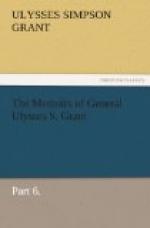The war has made us a nation of great power and intelligence. We have but little to do to preserve peace, happiness and prosperity at home, and the respect of other nations. Our experience ought to teach us the necessity of the first; our power secures the latter.
I feel that we are on the eve of a new era, when there is to be great harmony between the Federal and Confederate. I cannot stay to be a living witness to the correctness of this prophecy; but I feel it within me that it is to be so. The universally kind feeling expressed for me at a time when it was supposed that each day would prove my last, seemed to me the beginning of the answer to “Let us have peace.”
The expression of these kindly feelings were not restricted to a section of the country, nor to a division of the people. They came from individual citizens of all nationalities; from all denominations—the Protestant, the Catholic, and the Jew; and from the various societies of the land—scientific, educational, religious or otherwise. Politics did not enter into the matter at all.
I am not egotist enough to suppose all this significance should be given because I was the object of it. But the war between the States was a very bloody and a very costly war. One side or the other had to yield principles they deemed dearer than life before it could be brought to an end. I commanded the whole of the mighty host engaged on the victorious side. I was, no matter whether deservedly so or not, a representative of that side of the controversy. It is a significant and gratifying fact that Confederates should have joined heartily in this spontaneous move. I hope the good feeling inaugurated may continue to the end.
APPENDIX.
Report of lieutenant-general U. S. Grant, of the united states armies 1864-65.
Headquarters armies of the united states, Washington, D. C., July 22, 1865.
Hon. E. M. Stanton, Secretary of War.
Sir: I have the honor to submit the following report of the operations of the Armies of the United States from the date of my appointment to command the same.
From an early period in the rebellion I had been impressed with the idea that active and continuous operations of all the troops that could be brought into the field, regardless of season and weather, were necessary to a speedy termination of the war. The resources of the enemy and his numerical strength were far inferior to ours; but as an offset to this, we had a vast territory, with a population hostile to the government, to garrison, and long lines of river and railroad communications to protect, to enable us to supply the operating armies.




